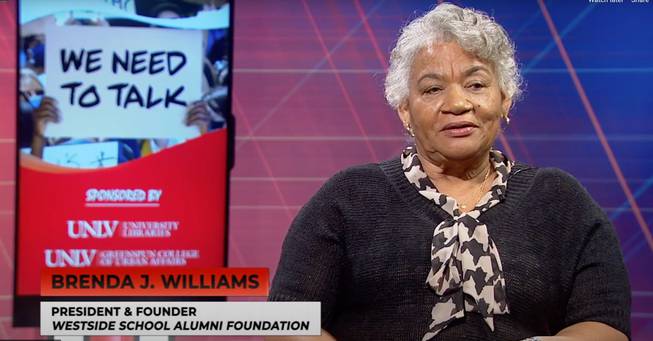
Brenda Williams, the first Black woman to serve on the Las Vegas City Council, takes part in an education series on racism at UNLV.
Monday, Sept. 21, 2020 | 2 a.m.
Brenda Williams had just been hired as the first Black bank teller in Nevada.
On her initial day on the job, she said her boss told her, “We have to work with you, but we don’t have to like it and we don’t have to like you.”
The customers in the early 1960s were equally cruel, often avoiding her line because “they didn’t want a Black person.”
“How ridiculous is that? Yet, when they saw my line moved faster than the others, they came over,” Williams said.
Williams shared her stories last week during the first episode of “We Need to Talk: Conversations on Racism for a More Resilient Las Vegas,” a virtual education series hosted in collaboration with UNLV Special Collections and Archives and UNLV Oral History Research Center. The series features university and community experts discussing issues of race.
“I was able to say some things that perhaps have been pent up that I just needed to get out. I never really discuss how I was treated at the bank,” Williams said.
Williams is considered a trailblazer for helping integrate the Las Vegas banking industry — before her, no Black worked in a nonservice capacity. She also was one of the first Blacks to work for the Department of Motor Vehicles, and eventually served as the first Black woman appointed to both the Las Vegas City Council and Planning Commission.
She told the virtual group that she was following in the footsteps of her mother, who was the first Black worker at Basic Magnesium Inc., a manufacturing plant in present-day Henderson in the 1940s.
“They hired her and said, ‘Get that broom and start sweeping’ ... Back in the day, they had a very strong union in the '40s. She went to the union and the next day my mom was standing next to the white ladies making munitions for World War II,” said Williams, who also worked for more than a decade for Nevada U.S. Sen. Richard Bryan.
Taking part in the series was important for Williams because it helps bring to light forms of systemic racism throughout the valley. Some, she says, still exist.
Williams said redlining — when government agencies and the private sector selectively deny financial or other services to neighborhoods with a high population of minority residents — is still prevalent.
“Back in the day, Black people saved their money. They always did. They couldn’t obtain a home loan, but the banker would give them the money to buy a Cadillac car,” she said.
Redlining was outlawed in 1968 with the Fair Housing Act, which prohibits discrimination in the sale, rental and financing of housing based on race, color, national origin, religion, sex, familial status and disability. But Williams said people of color still experience redlining in different forms today.
“When you order something online or you want to apply for something online the first thing that pops up is, ‘What’s your ZIP code?’ ... Right away you’re stigmatized. You’ll get a loan if you have the right credit rating, but you’ll get a higher interest rate,” she said.
A.B. Wilkinson, a UNLV associate professor of history and series panelist, said racism is found in many aspects of modern society — policing, banking, health care.
“(Policing) was created so they could put people, men particularly, white men particularly, in power in order to essentially track down runaway enslaved people. Through the different eras of history, we’ve just been building on the intergenerational trauma,” he said.
He also said people of color are often misdiagnosed and don’t receive appropriate care because health practitioners aren’t always culturally competent. He added that U.S. history is taught with an ethnocentric bias that undervalues the role that African Americans had in forming the country.
“White supremacists are not just the ones burning the crosses and carrying the torches. When we’re talking about white supremacy within systems or institutions, they’re baked into the cake,” Wilkinson said.
Kevin Wright, UNLV assistant director for student diversity, talked about how some colleges offer African American and Latino studies as a minor, as opposed to primary curriculum, as a way to “checklist diversity.”
“Then they put that in their mission statement and say, ‘We have a commitment to diversity. We have an Africana Studies minor.’ It’s just like, ‘That’s cute,’” Wright said.
Claytee White, director of UNLV Oral History Research Center, asked panelists if celebrity Black basketball players had the right to complain about systemic racism when they make so much money. Wilkinson said it takes people of color generations to accumulate wealth and data still shows disparities in income.
“Some students will say, ‘Hey, you got these basketball players making millions, how are African Americans still complaining about inequality? Obama was in the White House.’ ... Let’s look at how many people are making that type of money and the averages overall,” he said.
The purpose of “We Need to Talk” is to find concrete ways to address racism. Education and training to increase cultural competency in fields like mental health, schooling and policing were identified as partial fixes, but panelists agreed an approach of formulaic instruction and pseudo-inclusiveness won’t rid institutions of racism and people need to educate themselves.
“Check yourself. Check your privilege. Then go educate yourself. ... I’m not here to be Black Wikipedia or Black Google,” Wright said.
“We Need to Talk” is sponsored by UNLV University Libraries and Greenspun College of Urban Affairs. The next episode is 5:30 p.m. Oct. 1 and will be livestreamed at www.library.unlv.edu/weneedtotalk.
